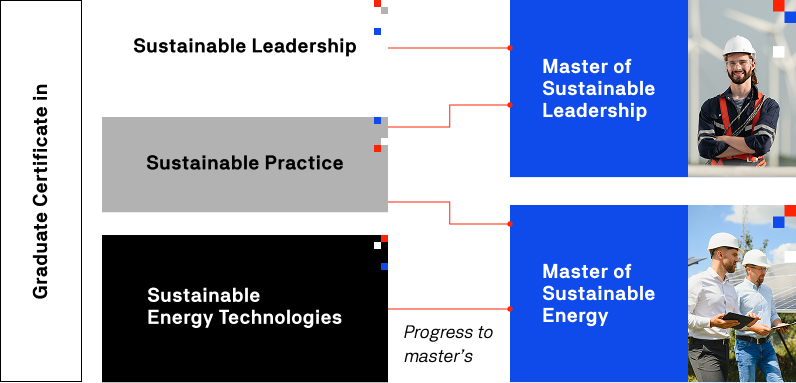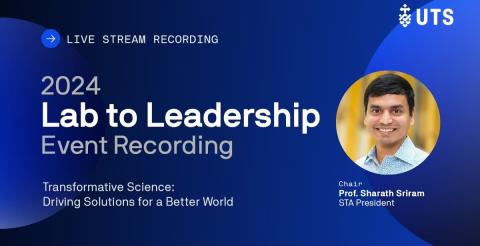Why study the Master of Sustainable Energy with UTS Online?
Top 100 University Globally2
Top 20 global university for advancing sustainable development1
A pathway to a fulfilling career in energy innovation, where sustainability is paramount
Unifying science, leadership and policy to provide a holistic approach to sustainable energy
1Times Higher Education Impact Ranking. 2QS World University Rankings, 2026.
Power the future of sustainable energy
Our clean energy future is just over the horizon. To get there, we’ll need to be powered by the best.
As we move towards a sustainable future, we need the best talent to power us forward. We require specialists who can use innovative solutions to solve complex problems in clean energy transition. We need experts who understand the economic, social and community impacts to implement innovation successfully. And we need leaders who can bridge the gap between science and action, influencing policy and empowering people to make meaningful change.
Develop the skills and knowledge to drive change and innovation across global energy challenges with the UTS Online Master of Sustainable Energy and not only future-proof your career but also contribute to the planet's well-being.
Who is this course for?
The Master of Sustainable Energy is designed for professionals who want to lead the transition to cleaner, smarter and more sustainable energy solutions. With a focus on innovation, leadership and technical expertise, this course is ideal for those working in engineering, science, technology or energy sectors who are ready to shape the future of sustainable energy.
If you’re ready to lead change in the global energy transition, this course provides the technical knowledge, leadership skills and industry insights to make a lasting impact.
This course is suited to professionals with relevant qualifications and experience, such as:
- Engineers working in energy, infrastructure or environmental projects seeking to integrate renewable and sustainable solutions.
- Scientists and researchers focused on advancing clean energy technologies and storage systems.
- Energy sector professionals looking to lead strategic change in renewable energy, grid management or decarbonisation initiatives.
- Policy makers and consultants responsible for developing sustainability strategies and energy transition policies.
- STEM professionals wanting to step into leadership roles driving innovation in sustainable energy systems.
If you're from a broader professional background and interested in studying our sustainability courses, the Graduate Certificate in Sustainable Practice may be a more suitable entry point.
See entry requirements under course information for more eligibility information.
What you will study
The UTS Online Master of Sustainable Energy comprises 12 online subjects (72 credit points (CP) in total).
Complete all of the following subjects:
- Shaping Policies for the Future
- Science of Climate Change for Leaders
- Sustainability Practices in Industry
- Science and Big Data
- Clean Energy Technology
- Sustainable Energy: Sources and Systems
- Innovations in Energy
- Technology and Innovation Management
- Communicating Science and Vision
- High Performance Science Leadership
- Leadership in Action
Note: Most UTS Online subjects are valued at 6 credit points each. For detailed subject descriptions and further information, please download a course guide.
Flexible course options
The Master of Sustainable Energy comprises 12 online subjects (72 credit points (CP) in total).
Students who complete the Graduate Certificate in Sustainable Practice or Graduate Certificate in Sustainable Energy Technologies may qualify to advance to the Master of Sustainable Energy, requiring only 8 additional subjects to complete the master's degree.
Graduate Certificate
4 Subjects | 8 months
Or continue studying
Master's
+6 Subjects | 2 Electives | 24 months
Graduate with a Master's degree
One of our Student Enrolment Advisors can assist you with more information, including alternative pathways.
Study pathways
The Faculty of Science offers 3 online Graduate Certificate courses to support your career in sustainability.
The Graduate Certificate in Sustainable Leadership leads to the Master of Sustainable Leadership, the Graduate Certificate in Sustainable Energy Technologies leads to the Master of Sustainable Energy, and the Graduate Certificate in Sustainable Practice provides a flexible pathway into either master's degree.
This allows you to tailor your studies to align with your career goals and develop specialist skills in the areas of sustainability that matter most to you.
Learning outcomes
Drive innovation in clean energy solutions
Research and critically evaluate emerging clean energy technologies, energy storage systems and sustainability innovations. Develop practical, science-backed solutions to complex energy challenges using real-world case studies.
Communicate sustainability with impact
Master the art of science communication to translate complex energy and sustainability concepts into compelling, actionable insights. Influence stakeholders and drive change through clear, effective messaging.
Lead the transition to a sustainable future
Develop leadership skills that empower you to shape the future of sustainable energy. Build a professional development profile that supports career growth, strategic decision-making and industry leadership.
Build versatile expertise for a dynamic career
Gain interdisciplinary skills that span science, policy and business, equipping you for diverse roles in the energy sector. Adapt to emerging industry demands and drive sustainable transformation across multiple fields.
Course information
Entry requirements
Applicants must have one of the following:
- Completed Australian bachelor's degree or higher qualification, or overseas equivalent in a chemistry, physics, engineering or relevant environmental science field of education#
OR
- Completed the UTS Graduate Certificate in Sustainable Energy Technologies or the UTS Graduate Certificate in Sustainable Practice
#Acceptable fields of education include:
- Biomedical engineering
- Chemical engineering
- Chemical sciences
- Communications technologies
- Electrical and electronic engineering and technology
- Electrical engineering
- Engineering and related technologies, n.e.c.
- Environmental engineering
- Environmental studies
- Fire technology
- Manufacturing engineering and technology
- Materials engineering
- Mining engineering
- Physics
- Process and resources engineering
- Process and resources engineering, n.e.c.
Eligibility for admission does not guarantee an offer of a place.
Want to check your eligibility?
Not only do we have the right tools and support teams to help you – we have people who care about your success.
Career outcomes
The UTS Online Master of Sustainable Energy equips professionals with the expertise to address the challenges of energy transitions, renewable technologies and sustainable energy management. This course prepares you to innovate and lead in a rapidly evolving energy sector.
Upon completion, graduates can explore roles such as:
- Renewable Energy Specialist
- Energy Transition Consultant
- Sustainable Energy Project Manager
- Policy Advisor (Energy and Environment)
- Energy Efficiency Analyst
$100,000
Average
salary
Sustainable energy roles in Australia offer competitive salaries, with positions such as Energy Efficiency Consultants earning between $70,000 and $100,000, indicating the financial rewards in this sector.
(Seek)
An expanding job market
There are over 1,000 job listings for sustainable energy engineers in Australia, reflecting the growing need for expertise in sustainable energy technologies.
(Seek)
Significant job growth in renewable energy
Employment in Australia's renewable energy sector is projected to comprise over 77% of the energy sector workforce by 2050, underscoring the expanding opportunities for sustainable energy professionals.
(University of Technology Sydney)
Upcoming intakes
UTS Online courses have 6 intakes per year. The diagram below shows all upcoming intakes. Our next intake is highlighted below.
-
Jan
2026 -
Mar
2026 -
May
2026 -
Jul
2026 -
Aug
2026 -
Oct
2026
Meet our Course Director
"Our graduates are equipped with the technical knowledge and leadership skills to assess, select, and recommend the best practices in sustainable energy. They are the future leaders who will collaborate across disciplines, making a significant difference in tackling the pressing challenge of our time -- climate change and its impact on our society, health, and the ecosystem."
Dr Parvez Mahmud
Senior Lecturer, School of Mathematical and Physical Sciences;
Program Director, Master of Sustainable Energy and Master of Sustainable Leadership
Download a course guide
Download a course guide to explore detailed subject descriptions, entry requirements, pathway options and fee information.
Frequently asked questions
The Master of Sustainable Energy equips you with the skills and knowledge to excel in leadership roles within the sustainable energy sector. You'll gain expertise in renewable energy technologies, energy efficiency strategies and sustainable energy policies. The program emphasises practical applications, enabling you to address complex energy challenges, drive organisational change and build a strong professional network to advance your career in the rapidly evolving field of sustainable energy leadership.
Yes, the Master of Sustainable Energy is designed for working professionals. Delivered entirely online, the program offers flexible learning options, allowing you to study at your own pace. With access to asynchronous course materials and discussions, you can balance your professional commitments with academic pursuits, making it feasible to work and study simultaneously.
Graduates of the Master of Sustainable Energy can pursue diverse career paths, including:
-
Renewable Energy Project Manager
-
Energy Consultant
-
Sustainable Energy Analyst
-
Energy Policy Advisor
-
Clean Energy Entrepreneur
These roles span industries such as renewable energy companies, government agencies, engineering firms, research institutions and environmental organisations. With the growing global demand for sustainable energy solutions, graduates are well-positioned to lead and drive meaningful change in the sector.
At UTS Online, your success is our priority, and that doesn't change when you study remotely. We're committed to providing you with a comprehensive range of student support services, guiding you from enrolment right through to graduation.
As a UTS student, you'll enjoy access to an array of support services, including:
-
Your own dedicated Student Success Advisor, available to answer any course-related questions you may have to keep you on track
-
UTS Career Hub for work experience and networking opportunities
-
Assignment writing and academic support from teachers & lecturers
-
Public speaking and peer learning support
-
Confidential medical and mental health services.
Connect with us to learn more about how we support your success while studying for a Master of Sustainable Energy at UTS Online.
Assignments in our subjects are authentic, relevant and often grounded in your personal clinical context. They vary according to the subject and include, but are not limited to clinical reports, posters, online quizzes and vivas (oral assessment), podcasts, recorded presentations, education tools, proposals, protocols and professional portfolios. You will not be required to complete exams or group assignments to graduate the Master of Sustainable Energy.
When studying the Master of Sustainable Energy, your online study experience includes:
-
Modules on renewable energy technologies and sustainability policies
-
Tools for applying energy strategies in real-world contexts
-
Access to industry-leading lecturers and peer collaboration
Here’s a video example showcasing key features of our online learning platform, including tools designed to enhance your study experience.
For practical tips on balancing your studies with work and life, click here to learn how to achieve your goals. Remember, our team is just an email or call away to support you every step of the way.













